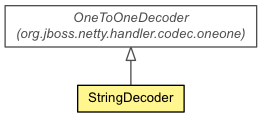
- java.lang.Object
-
- org.jboss.netty.handler.codec.oneone.OneToOneDecoder
-
- org.jboss.netty.handler.codec.string.StringDecoder
-
- All Implemented Interfaces:
- ChannelHandler, ChannelUpstreamHandler
@ChannelHandler.Sharable public class StringDecoder extends OneToOneDecoder
Decodes a receivedChannelBufferinto aString. Please note that this decoder must be used with a properFrameDecodersuch asDelimiterBasedFrameDecoderif you are using a stream-based transport such as TCP/IP. A typical setup for a text-based line protocol in a TCP/IP socket would be:
and then you can use aChannelPipelinepipeline = ...; // Decoders pipeline.addLast("frameDecoder", newDelimiterBasedFrameDecoder(80,Delimiters.lineDelimiter())); pipeline.addLast("stringDecoder", newStringDecoder(CharsetUtil.UTF_8)); // Encoder pipeline.addLast("stringEncoder", newStringEncoder(CharsetUtil.UTF_8));Stringinstead of aChannelBufferas a message:void messageReceived(
ChannelHandlerContextctx,MessageEvente) { String msg = (String) e.getMessage(); ch.write("Did you say '" + msg + "'?\n"); }
-
-
Nested Class Summary
-
Nested classes/interfaces inherited from interface org.jboss.netty.channel.ChannelHandler
ChannelHandler.Sharable
-
-
Constructor Summary
Constructors Constructor and Description StringDecoder()Creates a new instance with the current system character set.StringDecoder(Charset charset)Creates a new instance with the specified character set.StringDecoder(String charsetName)Deprecated.UseStringDecoder(Charset)instead.
-
Method Summary
Methods Modifier and Type Method and Description protected Objectdecode(ChannelHandlerContext ctx, Channel channel, Object msg)Transforms the specified received message into another message and return the transformed message.-
Methods inherited from class org.jboss.netty.handler.codec.oneone.OneToOneDecoder
handleUpstream
-
-
-
-
Constructor Detail
-
StringDecoder
public StringDecoder()
Creates a new instance with the current system character set.
-
StringDecoder
public StringDecoder(Charset charset)
Creates a new instance with the specified character set.
-
StringDecoder
@Deprecated public StringDecoder(String charsetName)
Deprecated. UseStringDecoder(Charset)instead.
-
-
Method Detail
-
decode
protected Object decode(ChannelHandlerContext ctx, Channel channel, Object msg) throws Exception
Description copied from class:OneToOneDecoderTransforms the specified received message into another message and return the transformed message. Returnnullif the received message is supposed to be discarded.- Specified by:
decodein classOneToOneDecoder- Throws:
Exception
-
-